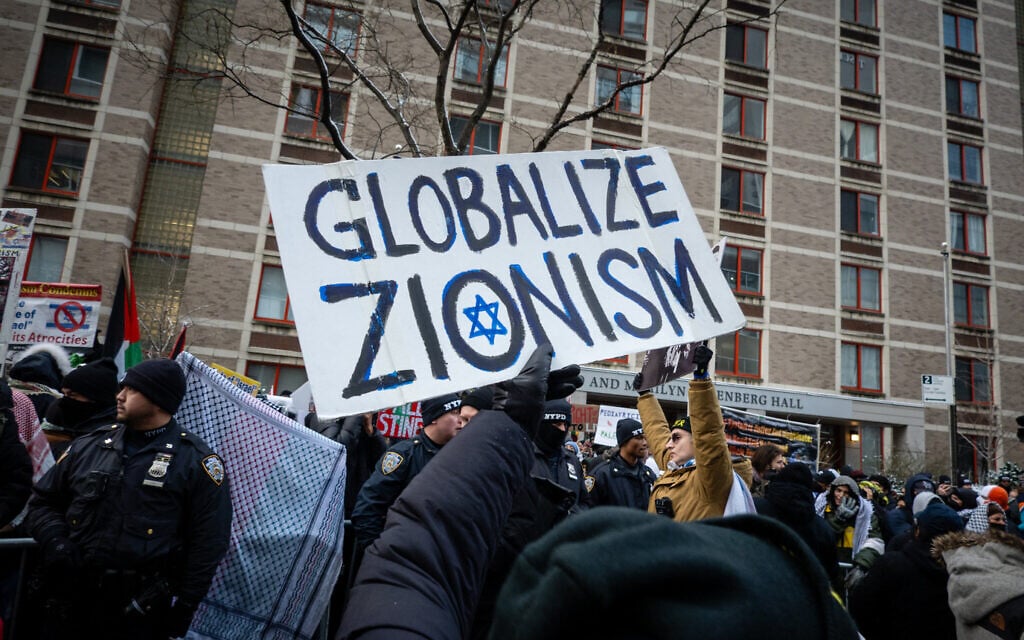
- Jewish pollsters say anti-Zionism is likely marginal in the US Jewish community, although exact figure is unclear because of difficulties in polling and confusion about the term
In a lawsuit filed this month against Northwestern University in Illinois, pro-Palestinian activists sought to halt the school’s required antisemitism training.
The training requires students to watch a video that outlines historical Jewish connections to Israel, says that most forms of anti-Zionism are antisemitic, and states that those views are “representative of the majority of Jewish people.”
The pro-Palestinian activists allege the video is discriminatory, including against anti-Zionist Jews, who, the lawsuit states, “are also a cognizable ethnic group” covered by federal civil rights protections.
But are anti-Zionist Jews a significant bloc of the American Jewish community, or insignificant outliers?
There is no clear answer, largely due to differing understandings of Zionism, a lack of data, and difficulties surveying US Jews, although the proportion of anti-Zionist Jews is likely marginal, Jewish community pollsters said.
Zionism, in the US today, is generally defined as support for Jewish self-determination in Israel, but not necessarily support for Israel’s government.
“Today, if you’re anti-Zionist, to me, it would mean that you’re against the existence of a Jewish state somewhere in the Holy Land,” said Ira Sheskin, a geographer at the University of Miami and the director of the Jewish Demography Project. “The percentage of Jews who fall in that category is very tiny.”
Jewish Voice for Peace (JVP), the leading anti-Zionist Jewish group in the US, said last year that it had 32,000 dues-paying members — a minuscule percentage of the more than 7.5 million American Jews. It’s also unclear how many JVP members identify as Jewish because the group says it does not ask.
Surveys of US Jews have not specifically asked about anti-Zionist identity. The Jewish People Policy Institute has posed the question on its surveys, but the group notes that its respondents tend to have a relatively strong connection to Jewish institutions or Israel, and are not wholly representative of the US Jewish population. In a June poll, the group found that 2 percent of respondents identified as anti-Zionist.
Sheskin surmised that some Jewish groups are reluctant to ask about anti-Zionism “because if it’s a significant percentage, they’re not going to want to advertise it.” He also said the use of the term “anti-Zionist Jews” was relatively rare until recently.
Part of the problem is that survey responses are sensitive to the particular time that a question is asked. Sheskin said that during a recent survey, he polled a Jewish community about local antisemitism. During the survey, a major antisemitic incident took place in the community, skewing the data between those who responded before the incident and after.
“The answers that you would get to a question about anti-Zionism during the Gaza war, it’s going to be different than it would have been before the Gaza war, and it’s going to be different than it’ll be two years from now,” he said.
‘No simple definition’
Even identifying Jews in polling can be difficult.
Jonathan Schulman, the head of The Jewish Majority advocacy organization, said that when his group conducts surveys, the pollsters first ask respondents if they are Jewish. If they say they are, the pollsters then ask if they believe in Jesus.
“You would be shocked at the large number of people who say, ‘Yes, I believe Jesus is the Messiah, I just identify as Jewish,’” Schulman said. “We don’t count that. There has to be some normative understanding here.”
There is also confusion about the term “Zionism.” The label has been distorted by anti-Israel activism, becoming a derogatory term for many Americans.
A poll last year of Jews aged 18-40 found that 42% did not know what the word “Zionist” means, while 90% said they care about Israel.
Some Jews, such as the Satmar Hasidic movement, are also theologically non-Zionist, but are not affiliated with the political anti-Zionism espoused by activist groups like JVP.
Simply asking Jews if they are Zionists would likely not gauge actual beliefs about the existence of Israel, Sheskin said.
“I wouldn’t want to say, ‘Are you anti-Zionist? Because they’re liable to say ‘yes’ when they’re just anti-Netanyahu,’” and not opposed to Israel’s existence, he said.
“I would present them with, ‘Do you believe that Jews are entitled to a state anywhere over at least part of the historic area of Palestine?’” he said. “That’s a question that might make it in some surveys that are coming up, but nobody so far has asked that question.”
The liberal group J Street found in a poll last year that 90% of US Jews believed that someone can criticize Israeli government policies and still be pro-Israel.
Schulman, whose group aims to push back against organizations like JVP with data, said he would frame the question as, “Do you believe that Israel should exist?’”
“I think the biggest issue is that there’s no simple definition,” he said. “People don’t understand the definition of anti-Zionism. Many people think that anti-Zionism is pushing back on specific Israeli policies. It’s not. Anti-Zionism is the demand that Israel cease to exist as a Jewish state.”
Some of the existing data indicate that American Jews overwhelmingly feel an affinity for Israel, even if the numbers do not line up exactly with Zionist beliefs.
In a poll released in February, The Jewish Majority found that 70% of US Jews believe that anti-Zionist movements are antisemitic by definition. Many of the remainder likely believe that anti-Zionism is not always antisemitic, but do not identify as anti-Zionist, Schulman said.
A major 2020 survey of Jewish Americans by the Pew Research Center found that 82% of US Jews said that caring about Israel is important or essential to what being Jewish means to them. There could be Jews who do not care about Israel, but also do not back the anti-Zionist position that Israel should be dismantled, though.
Non-attachment to Israel was highest among “Jews of no religion,” at 31%.
A February survey of American Jewish communal leaders found that 93% identified as pro-Israel and 91% as Zionist.
A poll of Jewish voters by the Jewish Electorate Institute last year found that 87% of respondents identified as pro-Israel.
The J Street poll last year found that 87% of American Jews thought it was antisemitic to oppose Israel’s right to exist
BY: The Times Union – TOI







